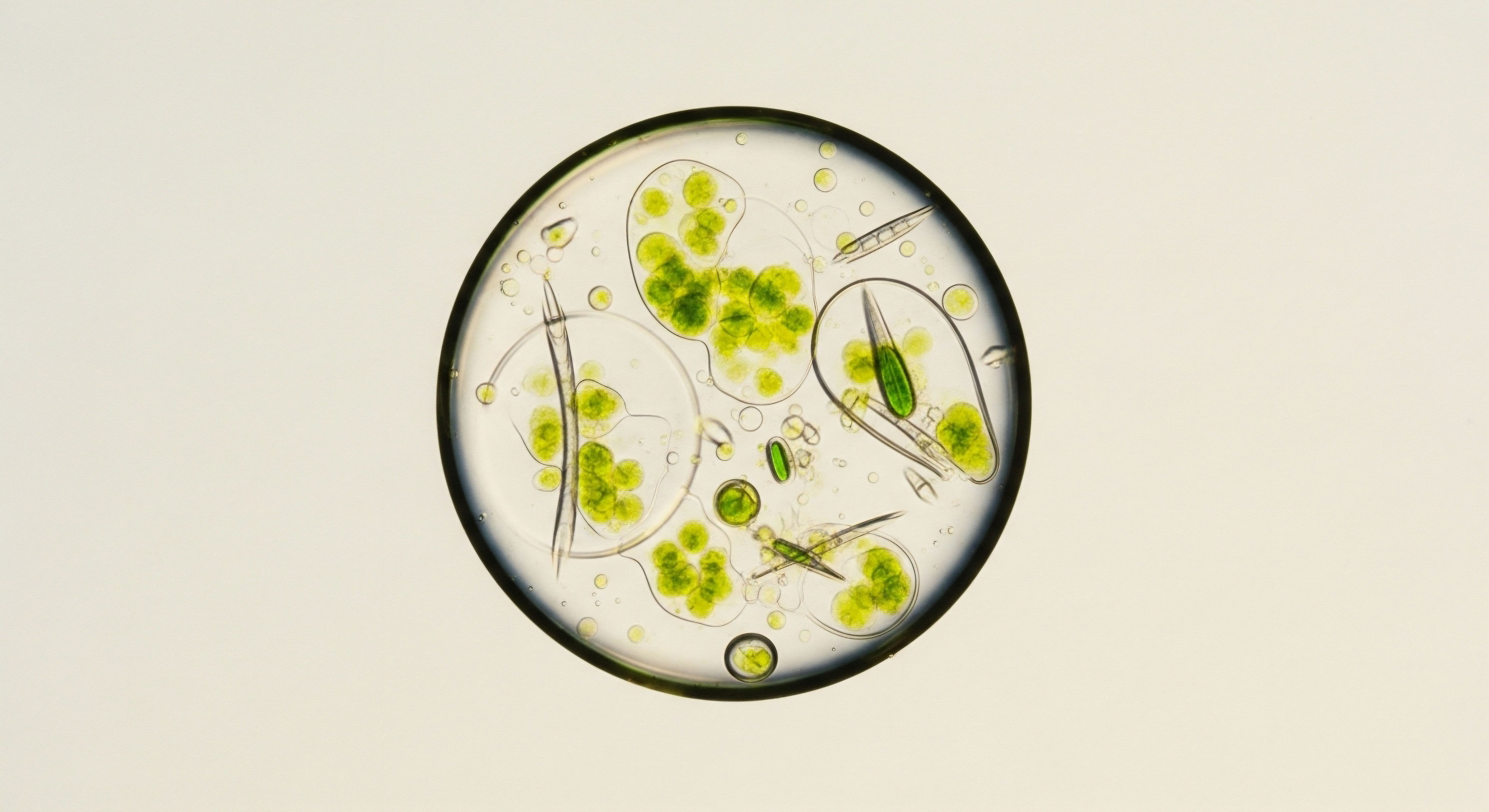

Fundamentals
Have you ever found yourself grappling with a persistent sense of fatigue, a diminished drive, or a subtle shift in your overall vitality? Perhaps you notice a lingering mental fog or a reduced capacity for physical exertion that simply was not present before.
These experiences, often dismissed as inevitable aspects of aging or daily stress, can frequently point to deeper physiological imbalances within your body’s intricate messaging systems. Your internal environment, a symphony of biochemical signals, relies on precise communication to maintain optimal function. When these signals falter, even slightly, the ripple effects can touch every aspect of your well-being, including the very rhythm of your heart.
Understanding your body’s hormonal landscape is not merely an academic exercise; it is a personal journey toward reclaiming your inherent capacity for health. Hormones, these powerful chemical messengers, orchestrate countless bodily processes, from energy metabolism to mood regulation and, critically, cardiovascular integrity. Among these, testosterone plays a significant, often misunderstood, role in both men and women. Its influence extends far beyond reproductive health, impacting muscle mass, bone density, cognitive sharpness, and the health of your circulatory system.
For many, the concept of hormonal optimization protocols, particularly those involving testosterone, brings forth questions about long-term implications. A common concern centers on the heart. Does supporting your endocrine system with targeted interventions truly promote overall well-being, or does it introduce unforeseen risks to your cardiovascular system? This exploration aims to provide clarity, translating complex clinical science into empowering knowledge that validates your lived experience while explaining the underlying biological mechanisms.

What Is Testosterone’s Role in Overall Health?
Testosterone, a steroid hormone belonging to the androgen group, is primarily produced in the testes in men and in smaller amounts by the ovaries in women, as well as by the adrenal glands in both sexes. This hormone is essential for the development of male secondary sexual characteristics, but its systemic actions are far more expansive.
It influences red blood cell production, contributes to bone strength, and helps regulate fat distribution. A healthy level of this biochemical messenger supports metabolic function, influencing how your body processes energy and maintains a balanced weight.
Testosterone is a vital chemical messenger influencing diverse bodily functions, including cardiovascular health, beyond its well-known reproductive roles.
When testosterone levels decline, whether due to age, chronic illness, or other factors, individuals may experience a range of symptoms. These can include persistent fatigue, reduced libido, changes in body composition with increased fat and decreased muscle, and even mood disturbances. These subjective feelings are often the first indicators that something within the endocrine system requires attention.
Addressing these concerns involves a careful assessment of your unique biological profile, moving beyond a simplistic view of symptoms to a deeper understanding of systemic health.

How Do Hormones Influence Cardiovascular Function?
The endocrine system and the cardiovascular system are deeply interconnected, operating in a continuous feedback loop. Hormones directly influence heart muscle function, blood vessel elasticity, blood pressure regulation, and lipid metabolism. For instance, thyroid hormones regulate metabolic rate, which directly impacts heart rate and cardiac output. Insulin, another key hormone, governs glucose utilization, and imbalances can lead to metabolic dysfunction that predisposes individuals to cardiovascular concerns.
Testosterone itself exerts direct and indirect effects on the heart and blood vessels. It can influence the relaxation and contraction of blood vessels, a process known as vasodilation, which helps regulate blood flow and pressure. It also plays a part in maintaining the health of the endothelium, the inner lining of blood vessels, which is critical for preventing the accumulation of arterial plaque.
Understanding these foundational connections helps us appreciate why any discussion of hormonal health must include a thorough consideration of cardiovascular well-being.


Intermediate
As we move beyond the foundational understanding of hormonal influence, a more detailed examination of specific clinical protocols becomes essential. For individuals experiencing symptoms related to suboptimal testosterone levels, targeted hormonal optimization protocols offer a path toward restoring physiological balance.
These interventions are not one-size-fits-all solutions; rather, they are meticulously tailored to individual needs, considering biological markers, symptom presentation, and overall health objectives. The goal is always to recalibrate the body’s internal systems, not simply to mask symptoms.

Testosterone Replacement Therapy for Men
For men diagnosed with clinical hypogonadism, a condition characterized by consistently low testosterone levels and associated symptoms, Testosterone Replacement Therapy (TRT) is a well-established intervention. The standard protocol often involves weekly intramuscular injections of Testosterone Cypionate, typically at a concentration of 200mg/ml. This method provides a steady release of the hormone, aiming to maintain physiological levels. However, a comprehensive approach extends beyond merely administering testosterone.
To support the body’s natural endocrine pathways and mitigate potential side effects, additional medications are frequently integrated into the protocol. For instance, Gonadorelin, administered via subcutaneous injections twice weekly, helps maintain the body’s intrinsic testosterone production and preserve fertility by stimulating the hypothalamic-pituitary-gonadal (HPG) axis. This prevents the complete suppression of endogenous hormone synthesis that can occur with exogenous testosterone administration alone.
Another critical component is Anastrozole, an oral tablet taken twice weekly. This medication acts as an aromatase inhibitor, preventing the conversion of testosterone into estrogen. While estrogen is vital for male health in appropriate amounts, excessive conversion can lead to undesirable effects such as gynecomastia or water retention.
Careful monitoring of estrogen levels ensures a balanced hormonal environment. In some cases, Enclomiphene may also be included to specifically support luteinizing hormone (LH) and follicle-stimulating hormone (FSH) levels, further aiding in the preservation of testicular function.

TRT Protocol Components for Men
| Component | Purpose | Administration |
|---|---|---|
| Testosterone Cypionate | Restores testosterone levels | Weekly intramuscular injection (200mg/ml) |
| Gonadorelin | Maintains natural production, fertility | 2x/week subcutaneous injection |
| Anastrozole | Blocks estrogen conversion | 2x/week oral tablet |
| Enclomiphene (optional) | Supports LH and FSH levels | Oral tablet (as prescribed) |

Testosterone Replacement Therapy for Women
Testosterone is equally vital for women’s health, albeit in much lower concentrations. Women experiencing symptoms such as persistent fatigue, low libido, mood changes, or irregular cycles, particularly during peri-menopause or post-menopause, may benefit from targeted testosterone support. The protocols for women are carefully calibrated to their unique physiology, recognizing the delicate balance of female hormones.
Typically, Testosterone Cypionate is administered weekly via subcutaneous injection, with dosages significantly lower than those for men, often ranging from 10 ∞ 20 units (0.1 ∞ 0.2ml). This precise dosing aims to restore testosterone to optimal physiological ranges without inducing masculinizing side effects. Additionally, Progesterone is prescribed based on the woman’s menopausal status, playing a crucial role in uterine health and overall hormonal balance.
For some women, Pellet Therapy offers a long-acting alternative, where small testosterone pellets are inserted subcutaneously, providing a sustained release over several months. When appropriate, Anastrozole may also be used in women to manage estrogen levels, particularly in cases where testosterone conversion is a concern. These protocols are designed to restore hormonal equilibrium, supporting vitality and addressing symptoms that significantly impact quality of life.
Personalized hormonal optimization protocols, including TRT for men and women, meticulously balance therapeutic benefits with careful management of the body’s intricate endocrine feedback systems.

Post-TRT or Fertility-Stimulating Protocols for Men
For men who have discontinued TRT or are actively trying to conceive, a specialized protocol is implemented to reactivate and optimize natural testosterone production and fertility. This involves a combination of agents designed to stimulate the HPG axis and manage hormonal feedback.
- Gonadorelin ∞ This peptide continues to play a central role, stimulating the pituitary gland to release LH and FSH, which in turn signal the testes to produce testosterone and sperm.
- Tamoxifen ∞ A selective estrogen receptor modulator (SERM), Tamoxifen helps to block estrogen’s negative feedback on the pituitary, allowing for increased LH and FSH secretion.
- Clomid (Clomiphene Citrate) ∞ Another SERM, Clomid works similarly to Tamoxifen, stimulating gonadotropin release and thereby promoting endogenous testosterone production and spermatogenesis.
- Anastrozole (optional) ∞ Depending on individual hormonal responses, Anastrozole may be included to manage estrogen levels during this phase, ensuring an optimal environment for fertility.
These protocols underscore the dynamic nature of hormonal health, emphasizing that interventions are not static but adapt to an individual’s evolving needs and life stages.

Growth Hormone Peptide Therapy and Other Targeted Peptides
Beyond direct hormone replacement, peptide therapies offer another avenue for biochemical recalibration, targeting specific physiological processes. These small chains of amino acids act as signaling molecules, influencing various bodily systems.
Growth Hormone Peptide Therapy is often sought by active adults and athletes for its potential anti-aging effects, support for muscle gain, assistance with fat loss, and improvements in sleep quality. Key peptides in this category include:
- Sermorelin ∞ A growth hormone-releasing hormone (GHRH) analog that stimulates the pituitary to produce and secrete growth hormone.
- Ipamorelin / CJC-1295 ∞ These peptides work synergistically to increase growth hormone secretion, promoting lean body mass and recovery.
- Tesamorelin ∞ Specifically approved for reducing visceral fat, it also has broader metabolic benefits.
- Hexarelin ∞ A potent growth hormone secretagogue that can also influence appetite and gastric motility.
- MK-677 (Ibutamoren) ∞ An oral growth hormone secretagogue that stimulates growth hormone release.
Other targeted peptides address specific health concerns:
- PT-141 (Bremelanotide) ∞ This peptide acts on melanocortin receptors in the brain to improve sexual health and libido in both men and women.
- Pentadeca Arginate (PDA) ∞ A peptide known for its roles in tissue repair, accelerated healing processes, and modulation of inflammatory responses.
These advanced therapies highlight the precision available in modern wellness protocols, moving beyond broad interventions to highly specific biochemical support.


Academic
The long-term effects of testosterone therapy on cardiovascular health represent a complex area of clinical science, characterized by evolving understanding and rigorous investigation. Initial concerns, stemming from early observational studies and small trials, suggested a potential for increased cardiovascular risk with testosterone administration.
However, a deeper analysis of the underlying mechanisms and the results from larger, more recent randomized controlled trials and meta-analyses paint a more nuanced picture, often indicating a neutral or even beneficial impact when therapy is appropriately managed.

How Does Testosterone Influence Cardiovascular Physiology?
Testosterone’s influence on the cardiovascular system is multifaceted, involving direct effects on cardiac muscle and vascular tissue, as well as indirect modulation of metabolic risk factors. At a cellular level, androgen receptors are present in cardiomyocytes and vascular endothelial cells, suggesting direct hormonal action.
Testosterone can promote vasodilation by increasing nitric oxide bioavailability, leading to improved blood flow and reduced arterial stiffness. This direct effect on vascular tone is a critical component of cardiovascular health, influencing blood pressure regulation and overall circulatory efficiency.
Beyond direct vascular effects, testosterone impacts several metabolic parameters that are intrinsically linked to cardiovascular risk. It plays a role in regulating lipid profiles, often leading to reductions in total cholesterol and low-density lipoprotein (LDL) cholesterol, while its effect on high-density lipoprotein (HDL) cholesterol remains less consistent across studies.
Furthermore, testosterone can improve insulin sensitivity and reduce visceral adiposity, both of which are significant contributors to metabolic syndrome and subsequent cardiovascular disease progression. A reduction in systemic inflammation, evidenced by decreased levels of inflammatory markers such as C-reactive protein (CRP) and interleukin-6 (IL-6), also contributes to a more favorable cardiovascular environment.
Testosterone therapy, when clinically indicated, appears to exert a neutral or beneficial influence on cardiovascular outcomes, challenging earlier concerns.

Clinical Evidence and Long-Term Outcomes
The landscape of evidence regarding testosterone therapy and cardiovascular health has undergone significant shifts. Early observational studies, some of which were retrospective, generated concerns about increased cardiovascular events, particularly in older men or those with pre-existing cardiovascular disease. These findings prompted regulatory advisories and heightened scrutiny.
However, more recent, robust clinical trials and comprehensive meta-analyses have provided reassuring data. A landmark study, the Testosterone Replacement Therapy for Assessment of Long-term Vascular Events and Efficacy ResponSE in Hypogonadal Men (TRAVERSE) trial, specifically designed to assess cardiovascular safety, found that testosterone therapy did not increase the risk of major adverse cardiovascular events (MACE) in men with hypogonadism.
This large-scale, placebo-controlled randomized trial tracked thousands of men, providing high-quality evidence that helps clarify previous ambiguities.
Multiple meta-analyses, synthesizing data from numerous randomized controlled trials, have corroborated these findings. For instance, a meta-analysis of 30 randomized controlled trials involving over 11,500 patients concluded that testosterone replacement therapy does not increase the risk of cardiovascular disease or all-cause mortality in hypogonadal men. Similar conclusions have been drawn from other systematic reviews, consistently reporting a neutral effect on MACE when hypogonadism is properly diagnosed and therapy is correctly administered.

Key Cardiovascular Outcomes in TRT Studies
| Cardiovascular Outcome | Observed Effect with TRT (Recent Meta-Analyses) | Relevant Mechanisms/Considerations |
|---|---|---|
| Major Adverse Cardiovascular Events (MACE) | Neutral effect; no increased risk compared to placebo. | Improved lipid profiles, insulin sensitivity, vasodilation. |
| Myocardial Infarction (Heart Attack) | No significant difference. | Reduction in pro-atherosclerotic factors. |
| Stroke | No significant difference. | Improved vascular function, blood pressure regulation. |
| All-Cause Mortality | No increased risk; some studies suggest reduced risk in long-term. | Overall metabolic and systemic health improvements. |
| Atrial Fibrillation | Slightly increased risk in some studies (e.g. TRAVERSE). | Requires careful monitoring, especially in susceptible individuals. |
| Hematocrit Elevation | Common side effect, requires monitoring. | Increased red blood cell production; managed by dose adjustment or phlebotomy. |

Addressing Specific Concerns and Monitoring Protocols
While the overall picture is reassuring, responsible clinical practice necessitates vigilance regarding specific potential side effects. The most commonly observed adverse event associated with testosterone therapy is an elevation in hematocrit, the proportion of red blood cells in the blood. Significant increases can raise blood viscosity, potentially increasing the risk of thrombotic events.
Therefore, regular monitoring of hematocrit levels is a standard component of TRT protocols. If levels become too high, dose adjustments or therapeutic phlebotomy (blood donation) may be necessary to mitigate this risk.
Another area of ongoing investigation involves the potential for testosterone therapy to influence atrial fibrillation, a type of irregular heartbeat. While some studies, including a subset of data from the TRAVERSE trial, have indicated a slight increase in the risk of non-fatal arrhythmias, other comprehensive reviews have not consistently confirmed this association. This highlights the importance of individualized patient assessment, particularly for those with pre-existing cardiac arrhythmias or risk factors.
The efficacy and safety of testosterone therapy are highly dependent on proper diagnosis of hypogonadism and meticulous management. This involves not only initial blood work to confirm low testosterone levels but also ongoing monitoring of various biomarkers, including testosterone, estrogen (estradiol), hematocrit, lipid panels, and prostate-specific antigen (PSA) levels.
Maintaining testosterone within physiological ranges, rather than supraphysiological levels, is paramount for maximizing benefits while minimizing potential risks. This precise recalibration of the endocrine system is what distinguishes responsible hormonal optimization from less informed approaches.

What Are the Implications for Personalized Wellness Protocols?
The evolving understanding of testosterone’s long-term effects on cardiovascular health reinforces the value of a personalized, systems-based approach to wellness. It moves beyond a simplistic view of “good” or “bad” hormones to an appreciation of their intricate interplay within the body.
For individuals seeking to reclaim vitality and function, this means engaging with a clinical team that prioritizes comprehensive diagnostics, individualized treatment plans, and continuous monitoring. The aim is to support the body’s innate intelligence, optimizing its biochemical environment to promote sustained health and resilience.

References
- Snyder, Peter J. et al. “Effects of Testosterone Treatment in Older Men.” New England Journal of Medicine, vol. 371, no. 11, 2014, pp. 1014-1024.
- Traish, Abdulmaged M. et al. “Testosterone and the Cardiovascular System ∞ A Comprehensive Review of the Basic Science Literature.” Journal of the American Heart Association, vol. 2, no. 5, 2013, e000271.
- Corona, Giovanni, et al. “Testosterone Replacement Therapy and Cardiovascular Risk ∞ A Review.” Reviews in Endocrine and Metabolic Disorders, vol. 17, no. 2, 2016, pp. 197-206.
- Morgentaler, Abraham, et al. “Major Cardiovascular Disease Risk in Men with Testosterone Deficiency (Hypogonadism) ∞ Appraisal of Short, Medium and Long-Term Testosterone Therapy ∞ A Narrative Review.” European Heart Journal, vol. 41, no. 29, 2020, pp. 2753-2763.
- Wu, Frederick C.W. et al. “Testosterone Replacement Therapy for Assessment of Long-term Vascular Events and Efficacy ResponSE in Hypogonadal Men (TRAVERSE).” New England Journal of Medicine, vol. 389, no. 2, 2023, pp. 107-117.
- Jones, T. Hugh, et al. “Effect of Testosterone Therapy on Cardiovascular Risk Factors, Major Adverse Cardiovascular Events and Mortality in Men with Functional Hypogonadism and Cardiovascular Disease in a Real-World Registry.” European Heart Journal, vol. 41, no. 46, 2020, pp. 4417-4427.
- Boron, Walter F. and Emile L. Boulpaep. Medical Physiology. 3rd ed. Elsevier, 2017.
- Guyton, Arthur C. and John E. Hall. Textbook of Medical Physiology. 14th ed. Elsevier, 2020.

Reflection
As you consider the intricate details of hormonal health and its connection to cardiovascular well-being, perhaps a new perspective on your own body begins to form. The journey toward optimal vitality is deeply personal, marked by continuous learning and thoughtful adaptation.
Understanding the scientific underpinnings of conditions like hypogonadism and the mechanisms of therapeutic interventions is a powerful first step. It transforms vague concerns into actionable insights, allowing you to engage with your health not as a passive recipient, but as an informed participant.
This knowledge is not an endpoint; it is a compass. It guides you in asking precise questions, in interpreting your body’s signals with greater clarity, and in collaborating with clinical professionals to design a path that honors your unique biological blueprint.
The goal is not merely to alleviate symptoms, but to restore a profound sense of balance and function, enabling you to live with sustained energy and purpose. Your body possesses an inherent capacity for resilience, and by supporting its fundamental systems, you can unlock a deeper level of well-being.



